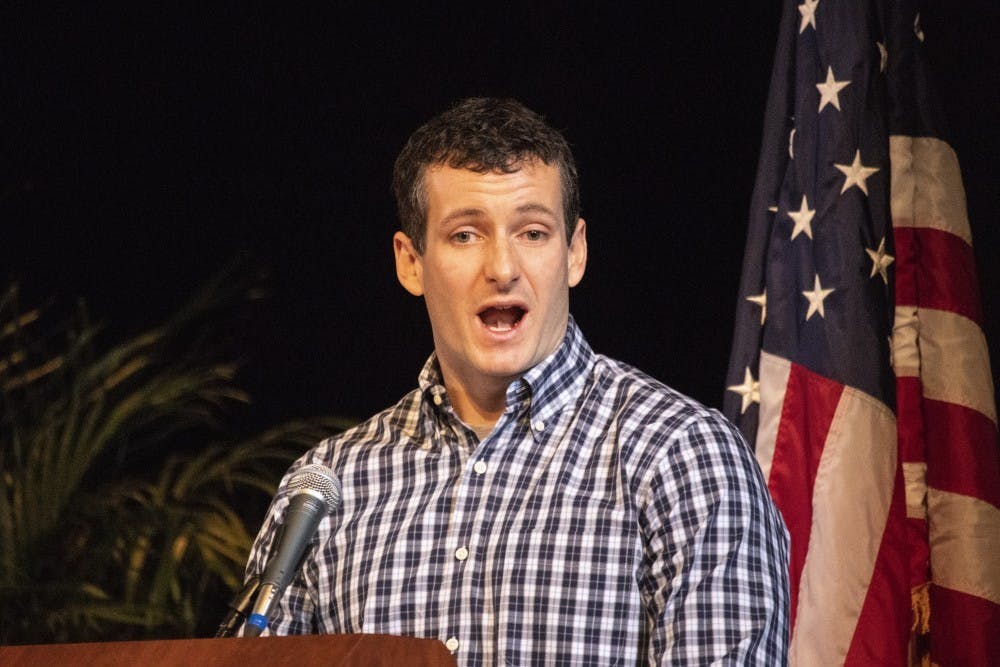In addition to the fears surrounding the global pandemic, Americans face an economy that continues to decline.
In an interview Tuesday with Indianapolis radio station WIBC-FM, Rep. Trey Hollingsworth, R-9th District, said he supports ending social distancing to stimulate the faltering economy, even though it will cause deaths.
"It is always the American government's position to say,” Hollingsworth said in the interview. “In the choice between the loss of our way of life as Americans and the loss of life, of American lives, we have to always choose the latter."
Hollingsworth said he is advocating for Americans to return to work, school and places of worship.
His comments were made against the backdrop of a deepening economic recession. Due to stay-at-home orders and the loss of their jobs, Americans are contributing less to the economy.
IU experts remained neutral on Hollingsworth's comments, but said opening businesses at this time is not the only solution and contributed their perspective on the economy.
Philip Powell, Kelley School of Business business economics professor, said households are spending 25% to 30% less money on average. Overall economic activity has decreased between 30% and 40%.
Unemployment is at levels that haven’t been seen since the Great Depression, Powell said. About 22 million people in the country have lost their jobs.
Ryan Brewer, a professor of finance at Indiana University-Columbus, said unemployment insurance claims went up 9,400% between March 14 and March 21 in southeastern Indiana. The claims then went up again by 19,000% the next week.
“These numbers seem like science fiction,” Brewer said.
Brewer said there are two extreme ideas about how to deal with the economy under COVID-19.
The first is to continue to socially isolate until a vaccine is discovered. He said this option will result in a deep economic crisis involving disrupted food supply chains, which would cause an increase in deaths.
“The other extreme is to go back to work right now and forget about it,” Brewer said “In which case we would have a lot of unnecessary deaths.”
This recession is different than those in the past because it is not caused by economic failure, but rather by a self-imposed limit of economic activity in order to combat the spread of the coronavirus.
“Before COVID-19, the economy was fundamentally strong,” Powell said. "That means that if the public health crisis subsides, then the economy can get back to the strength that it had.”
Powell said the public health elements of the situation require patience. He estimates the economic recovery time will be between 12 to 18 months, a short time compared to the way the economy typically functions, but still a long time for someone without a job.
“Once you do lift the social controls, then you allow the process for economic rehabilitation,” Powell said. “But the longer we stay on lockdown, the longer before the economy can start to heal.”
Opening nonessential businesses right now to help the economy recover would lead to more deaths from the coronavirus. Hollingsworth's decision would require ethical trade-offs, Powell said.
Andrew Butters, professor of business economics and public policy at Kelley, said ending the stay-at-home order will not fix the economy. Even if the government lifts the social controls on businesses, that does not mean consumers will feel safe enough to participate.
“What’s ultimately going to be the final judge as to when we start having a robust recovery is when the customers return,” Butters said.
Butters said fear and uncertainty are a detriment to the economy. These sentiments could become worse if lifting the stay-at-home order causes an increase in deaths.
The high unemployment levels also mean many Americans have experienced a significant decrease or loss of income. This means they couldn’t participate in the economy in the same ways they did before the pandemic, even if businesses opened, Butters said.
Brewer said the solution needs to compromise between these two concepts and would end social distancing in phases. Lifting stay-at-home orders will have to look different for parts of the country with different population densities.
A more drastic economic situation is possible if no action is taken, but Brewer said he doesn’t think the country will reach that state in the near future. The longer the economy remains closed, the more dangerous the situation becomes, he said.
“We do have time, but we have to use it wisely,” Brewer said. “We have to have people developing solutions for this and we have to come together with a compromise solution to get back into the economy quicker rather than later.”




